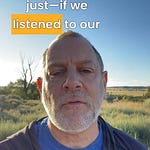Playback speed
×
Share post
Share post at current time
Share from 0:00
0:00
/
0:00
Transcript
Holy Hilltop Temple Debate, Continued.
Weekly Video Recap of Below the Bible Belt
Mar 15, 2024
The Vatican, Mecca, the Taj Mahal, Jerusalem- or your favorite beach: There is a lot of power and purpose in a central pilgrimage site. There’s also a lot of trouble and many tensions that rise when the sacred is located in a single and contested hot spot… And that’s part of the problem we’re witnessing on this specific day during these difficult days -- although it’s hardly a new story. This hotspot is one of the oldest disputes about theological beliefs and territorial claims, going back thousands of years.
Welcome to Below the Bible Belt’s weekly’s video where I review the chapters we’ve read this past week on our 3 1/12 year journey to read through the entire Hebrew Bible to better know where we’re from, how the ancient page impact today’s headlines - and how we could and should create a better, kinder, and more just history that can heal some of our inherited ancestral trauma. We’re 2+ years into this journey and about to wrap up the prophets.
Today - once again - the prophetic voice meets our problems -
Today Muslims mark the first Friday of the Holy Month of Ramadan. 50,000 participated peacefully in prayer today, despite security tensions and restrictions, on the holy mountain, haram Al sharif, in Jerusalem, in the midst of this already terrible crisis in Gaza and Israel.
This sacred mountain is often in the news because it means a lot to both Jews and Muslims. It was the site of the temple of YHWH, twice built and destroyed, it was also a church and a pagan temple, and it’s been a Muslim prayer site for hundreds of years.
But the struggle over the important role of this site predates the conflict.
From the Jewish historical perspective - there has always been a struggle between those who wanted a centralized temple in Jerusalem - and those who thought it was a terrible idea. This is not just about the debate about homeland vs. diaspora. This is also about the deeper religious question - is god everywhere and therefore worthy of worship everywhere -- or should there be a central, single address where the divine headquarters are defined?
This past week we saw interesting clues about this debate that showed up as we began reading the latter prophets -- the ones who spoke to the people who came back to Jerusalem after the 70 years of Babylonian exile in the latter part of the 6th century BCE.
To build or not to build the temple?
That seems to have been one of the big questions for the pioneers who wanted to build back their homes and fortify their city. And although they were given permission by the Persian authorities to rebuild their temple -- but not the royal palace - it seems that for at least 18 years they didn’t do much about it.
Haggai, the 10th of the minor prophets rails against the people who prioritize their homes over god’s home. He wants them to build the temple so that their economic and social stability is secure. And because God said so. His name means ‘my holidays’ which may mean he's' connected to the priestly system that managed the temple and profited from it. But other voices, including the prophet Isaiah think it’s a terrible idea. Why focus on a single spot for God when the divine is everywhere? Perhaps there are other ways to spend our money and celebrate more locally as once our ancestors did?
Haggai will win. The second temple was built.
But what’s interesting to note is that he managed to convince more of the people to do it - together. Perhaps despite different opinions they agreed to focus on a central project that will unify them when so many factors and foreign threats were on their doorstep?
We know this from the use of the plural forms of address that Haggai uses -- often lost in translation. In the old days it was kings who built the temple - Solomon, or Hezekiah - later Herod. But Haggai speaks to the people as a whole, urging them to build - together.
Whether this was how it was or not - who knows.It is the winner who write down the history and leave out narratives that they prefer we never know..
But on this day, we wish for people, everywhere, to find worthy ways to come together, build societies and project, each with their own gift and passion, projects like temples that prioritize the sacred within each and every one of us, sanctuaries of the spirit, unity in purpose of peace, less about locations and more about the love that’s everywhere, all the time..
May there be peace in our holy places and more patience in every heart.
Ramadan Kareem to my Muslim friends, hope and healing,
Shabbat Shalom.
Recent Posts












Share this post